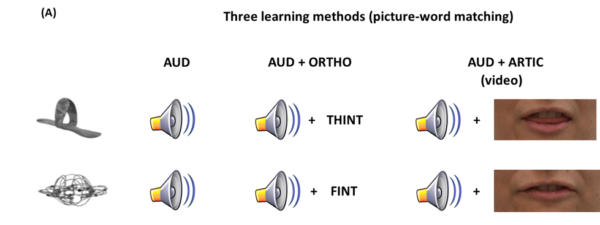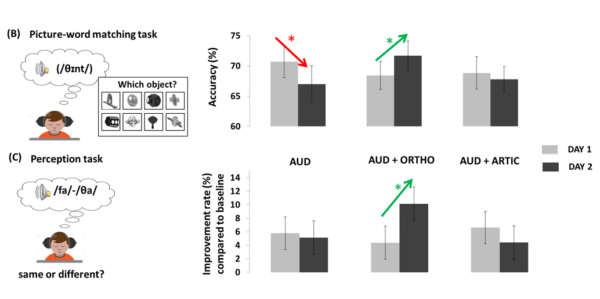|
Dear members of the ILCB,
Welcome to the new academic year, which holds the promise for exciting collaborations, conferences and meetings! We had a sneak preview of this at the ILCB summer school at the end of August (see below). A big thanks to the organizers for an outstanding summer conference! Lots of new people joined the ILCB over the summer and you’ll find the portrait of some of them below.
I look forward to seeing many of you at our various upcoming events.
Best wishes,
Johannes |
| |
|
"Generative adversarial networks unlock new methods for cognitive science." |
|
While technically a "quote", it is really the title of a very interesting paper recently published in Trends in Cognitive Sciences |
|
|
| |
|
When written words speak louder than actions… |
|
Native speakers of French have difficulty distinguishing the English /θ/-/f/ phonemic contrast (e.g. three vs. free). Could articulatory gestures or the word’s written form help them learn new English words containing these confusable sounds?

(A) Three learning methods were compared: AUD: auditory forms of new words alone; AUD+ORTHO: auditory forms and their written, orthographic representations; AUD+ARTIC: auditory forms and their corresponding articulatory gestures.

When simultaneously presented with speech, both visual cues allowed participants to better dissociate and learn minimal-pair words. However, only the AUD+ORTHO learning led to a residual, long term benefit.
(B) There was a significant increase of performance in the picture-word matching task measured the day after the learning session (Day2) suggesting the overnight consolidation of the new lexical knowledge.
(C) This consolidated lexical knowledge also had a top-down influence, leading to enhanced perceptual ability by reinforcing the distinct phonological categories of the /θ-/f/ contrast.
Pattamadilok et al. (in press). Journal of Experimental Psychology: Learning, Memory, and Cognition
|
|
|
| |
|
Isabelle Darcy, Professor at Indiana University Bloomington (USA)
|
|
Dr. Isabelle Darcy is Professor of Second Language Studies at Indiana University Bloomington (USA) and currently a research fellow at the IMéRA/ILCB until July 2022. Her research explores how adult language learners acquire… |
|
|
|
|
|
Franziska Geringswald
|
|
Franziska Geringswald is joining the CREx engineer team. Franziska obtained a Ph.D. in Natural Sciences from Otto-von-Guericke University of Magdeburg, Germany. She then worked with Marie-Hélène Grosbras (LNC) for several years. Franziska has… |
|
|
|
|
|
Raphaël PY
|
|
Raphaël Py was awarded a 2021 ILCB PhD grant to conduct a project under the supervision of Marie Montant (LPC) and Marie-Hélène Grosbras (LNC). Raphaël was drawn to ILCB by its multiple research… |
|
|
|
|
|
Auriane Boudin
|
|
Auriane Boudin was awarded a 2021 ILCB PhD grant to conduct a project under the supervision of Philippe Blache (LPL) and Magalie Ochs (LIS), and collaborations with Roxane Bertrand (LPL) and Stéphane Rauzy… |
|
|
|
|
| |
|
Strengths and challenges of longitudinal non-human primate neuroimaging |
|
Xiaowei Song, Pamela García-Saldivar, Nathan Kindred, Yujiang Wang, Hugo Merchant, Adrien Meguerditchian, ... & Colline Poirier |
|
|
|
|
Do you want /ʃoloka/ on a /bistɔk/? On the scope of transposed-phoneme effects with non-adjacent phonemes |
|
Sophie Dufour, Jonathan Mirault, & Jonathan Grainger |
|
|
|
| |
|
Master in Cognitive Science |
| |
|
Class of 2021 - Master in Cognitive Science |
|
The class of 2021 of the master in Cognitive Science, aka MasCo, is here! On this very week, 27 students are joining the Master 1, of which 14 will follow… |
|
|
| |
|
| |
|
Another truly remarkable ILCB summer school!
|
|
This year 140 students from all over the world (France, Italy, Russia, Mexico, Taiwan…) gathered at CIRM on the Luminy Campus for the 4th ILCB summer school. They were offered a variety of introductory and advanced courses… |
|
|
|
|
| |
ILCB is affiliated to Aix-Marseille Université, CNRS, INSERM, and Université d'Avignon
5 avenue Pasteur 13604 Aix-en-Provence Cedex 1 B.P. 80975 +33 (0)4 13 55 36 31
Copyright © ILCB 2021
| |
|